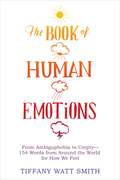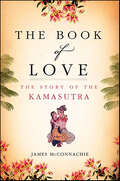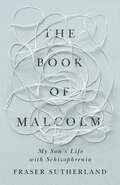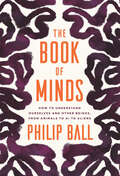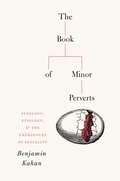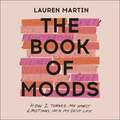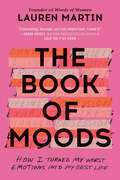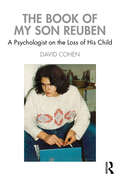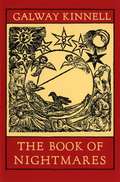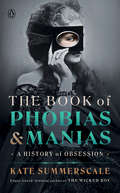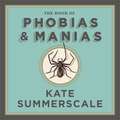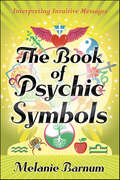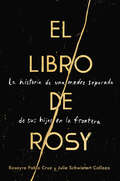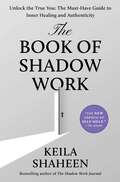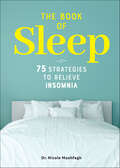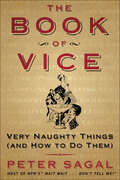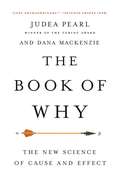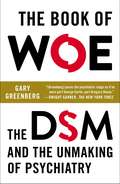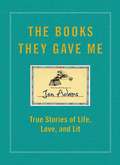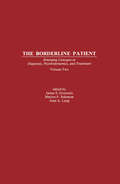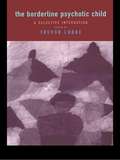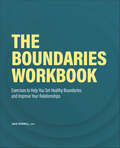- Table View
- List View
The Book of Human Emotions: From Ambiguphobia to Umpty -- 154 Words from Around the World for How We Feel (Wellcome Ser.)
by Tiffany Watt SmithA thoughtful, gleeful encyclopedia of emotions, both broad and outrageously specific, from throughout history and around the world.How do you feel today? Is your heart fluttering in anticipation? Your stomach tight with nerves? Are you falling in love? Feeling a bit miffed? Do you have the heebie-jeebies? Are you antsy with iktsuarpok or filled with nakhes?Recent research suggests there are only six basic emotions. But if that makes you feel uneasy, suspicious, and maybe even a little bereft, THE BOOK OF HUMAN EMOTIONS is for you. In this unique book, you'll get to travel across the world and through time, learning how different cultures have articulated the human experience and picking up some fascinating new knowledge about yourself along the way.From the familiar (anger) to the foreign (zal), each entertaining and informative alphabetical entry reveals the surprising connections and fascinating facts behind our emotional lives. Whether you're in search of the perfect word to sum up that cozy feeling you get from being inside on a cold winter's night, surrounded by friends and good food (what the Dutch call gezelligheid), or wondering how nostalgia evolved from a fatal illness to enjoyable self-indulgence, Tiffany Watt Smith draws on history, anthropology, science, art, literature, music, and popular culture to find the answers.In reading THE BOOK OF HUMAN EMOTIONS, you'll discover feelings you never knew you had (like basorexia, the sudden urge to kiss someone) and gain unexpected insights into why you feel the way you do. Besides, aren't you curious what nginyiwarrarringu means?
The Book of Hygge
by Louisa Thomsen BritsThe most beautiful guide to the Danish custom of hygge, the everyday life philosophy for better living. Hygge is a feeling of belonging and warmth, a moment of comfort and contentment. This beautiful little book will help you to find hygge and embrace it every day. Make a pot of coffee, relax in your favourite chair and discover for yourself how life is better with hygge. 'Best [book] for the philosophy of hygge' You Magazine '. . . a philosophy for mindful living' The Guardian 'Her book is a thing of beauty' Irish Examiner
The Book of Love: The Story of the Kamasutra
by James McConnachieAn engaging, enlightening "biography" of the ancient Hindu manuscript that became the world's most famous sex manualThe Kamasutra is one of the world's best-known yet least-understood texts, its title instantly familiar but its actual contents widely misconstrued. In the popular imagination, it is a work of practical pornography, a how-to guide of absurdly acrobatic sexual techniques. Yet the book began its long life in third-century India as something quite different: a seven-volume vision of an ideal life of urbane sophistication, offering advice on matters from friendship to household decoration. Over the ensuing centuries, the Kamasutra was first celebrated, then neglected, and very nearly lost—until an outrageous adventurer introduced it to the West and earned literary immortality.In lively and lucid prose, James McConnachie provides a rare, intimate look at the exquisite civilization that produced this cultural cornerstone. He details the quest of famed explorer Richard F. Burton, who—along with his clandestine coterie of libertines and iconoclasts—unleashed the Kamasutra on English society as a deliberate slap at Victorian prudishness and paternalism. And he describes how the Kamasutra was driven underground into the hands of pirate pornographers, until the end of the Lady Chatterley obscenity ban thrust it once more into contentious daylight.The first work to tell the full story of the Kamasutra, The Book of Love explores how a remarkable way of looking at the world came to be cradled between book covers—and survived.
The Book of Malcolm: My Son's Life with Schizophrenia
by Fraser SutherlandA father reflects on the rich life of his son, who died suddenly at twenty-six after living with schizophrenia. On the morning of Boxing Day 2009, the poet Fraser Sutherland and his wife, Alison, found their son, Malcolm, dead in his bedroom in their house. He was twenty-six and had died from a seizure of unknown cause. Malcolm had been living with schizophrenia since the age of seventeen.Fraser’s respectful narration of his son’s life — the boy’s happiness as well as his sufferings, his heroic efforts to calm his troubled mind, his readings, his writings, his experiments with religious thought. This is a master writer’s attempt to give his son’s life shape and dignity, to memorialize his life as more than an illness. And in writing his son’s life, Fraser creates his own self-effacing memoir — the memoir of a parent’s resilience through years of stressful care.Fraser Sutherland, one of Canada’s finest poetry critics and essayists, died shortly after completing this book. A RARE MACHINES BOOK
The Book of Minds: How to Understand Ourselves and Other Beings, from Animals to AI to Aliens
by Philip BallPopular science writer Philip Ball explores a range of sciences to map our answers to a huge, philosophically rich question: How do we even begin to think about minds that are not human? Sciences from zoology to astrobiology, computer science to neuroscience, are seeking to understand minds in their own distinct disciplinary realms. Taking a uniquely broad view of minds and where to find them—including in plants, aliens, and God—Philip Ball pulls the pieces together to explore what sorts of minds we might expect to find in the universe. In so doing, he offers for the first time a unified way of thinking about what minds are and what they can do, by locating them in what he calls the “space of possible minds.” By identifying and mapping out properties of mind without prioritizing the human, Ball sheds new light on a host of fascinating questions: What moral rights should we afford animals, and can we understand their thoughts? Should we worry that AI is going to take over society? If there are intelligent aliens out there, how could we communicate with them? Should we? Understanding the space of possible minds also reveals ways of making advances in understanding some of the most challenging questions in contemporary science: What is thought? What is consciousness? And what (if anything) is free will? Informed by conversations with leading researchers, Ball’s brilliant survey of current views about the nature and existence of minds is more mind-expanding than we could imagine. In this fascinating panorama of other minds, we come to better know our own.
The Book of Minor Perverts: Sexology, Etiology, & the Emergences of Sexuality
by Benjamin KahanShortlisted for the Modernist Studies Assocation Book Prize Statue-fondlers, wanderlusters, sex magicians, and nymphomaniacs: the story of these forgotten sexualities—what Michel Foucault deemed “minor perverts”—has never before been told. In The Book of Minor Perverts, Benjamin Kahan sets out to chart the proliferation of sexual classification that arose with the advent of nineteenth-century sexology. The book narrates the shift from Foucault’s “thousand aberrant sexualities” to one: homosexuality. The focus here is less on the effects of queer identity and more on the lines of causation behind a surprising array of minor perverts who refuse to fit neatly into our familiar sexual frameworks. The result stands at the intersection of history, queer studies, and the medical humanities to offer us a new way of feeling our way into the past.
The Book of Moods: How I Turned My Worst Emotions Into My Best Life
by Lauren Martin"Hilariously witty, unflinchingly honest, and brimming with hope." Bobbi Brown"A fascinating, thorough, and truly helpful book. I loved it!" Sarah Knight, New York Times bestselling author of Calm the F*ck DownThe Happiness Project meets So Sad Today in this "hilariously witty, unflinchingly honest" book from the beloved founder of Words of Women, contemplating the nature of negative emotions, and the insights that allowed her to take back control.Five years ago, Lauren Martin was sure something was wrong with her. She had a good job in New York, an apartment in Brooklyn, a boyfriend, yet every day she wrestled with feelings of inferiority, anxiety and irritability. It wasn't until a chance encounter with a (charming, successful) stranger who revealed that she also felt these things, that Lauren set out to better understand the hold that these moods had on her, how she could change them, and began to blog about the wisdom she uncovered. It quickly exploded into an international online community of women who felt like she did: lost, depressed, moody, and desirous of change.Inspired by her audience to press even deeper, The Book of Moods shares Lauren's journey to infuse her life with a sense of peace and stability. With observations that will resonate and inspire, she dives into the universal triggers every woman faces - whether it's a comment from your mother, the relentless grind at your job, days when you wish the mirror had a Valencia filter, or all of the above. Blending cutting-edge science, timeless philosophy, witty anecdotes and effective forms of self-care, Martin has written a powerful, intimate, and incredibly relatable chronicle of transformation, proving that you really can turn your worst moods into your best life.A powerful, intimate, and incredibly relatable chronicle of transformation, proving that you really can turn your worst moods into your best life.(P)2020 Hachette Audio
The Book of Moods: How I Turned My Worst Emotions Into My Best Life
by Lauren MartinThe Happiness Project meets So Sad Today in this "hilariously witty, unflinchingly honest" book from Words of Women founder Lauren Martin, as she contemplates the nature of negative emotions -- and the insights that helped her to take control of her life (Bobbi Brown).Five years ago, Lauren Martin was sure something was wrong with her. She had a good job in New York, an apartment in Brooklyn, a boyfriend, yet every day she wrestled with feelings of inferiority, anxiety and irritability. It wasn't until a chance encounter with a (charming, successful) stranger who revealed that she also felt these things, that Lauren set out to better understand the hold that these moods had on her, how she could change them, and began to blog about the wisdom she uncovered. It quickly exploded into an international online community of women who felt like she did: lost, depressed, moody, and desirous of change.Inspired by her audience to press even deeper, The Book of Moodsshares Lauren's journey to infuse her life with a sense of peace and stability. With observations that will resonate and inspire, she dives into the universal triggers every woman faces -- whether it's a comment from your mother, the relentless grind at your job, days when you wish the mirror had a Valencia filter, or all of the above. Blending cutting-edge science, timeless philosophy, witty anecdotes and effective forms of self-care, Martin has written a powerful, intimate, and incredibly relatable chronicle of transformation, proving that you really can turn your worst moods into your best life.
The Book of My Son Reuben: A Psychologist on the Loss of His Child
by David Cohen"I wish I had not had to write this book because then my lovely son Reuben would still be alive," says David Cohen. "He was adorable, formidably intelligent, a loving son, a loving brother. He died far too young. He had the bad luck to have two grandparents who had addictive personalities. His efforts to resist the lure of drugs failed. And so did I." The Book of My Son Reuben is a personal account of how psychologist David Cohen coped – and did not cope – with the death of his son, Reuben. Offering a unique perspective on the experience of parental loss, it offers a personal and analytical exploration of sorrow and guilt, and of what research tells us about trauma and grief. Illustrated throughout with David Cohen’s personal insight into how he continues to navigate his loss, this honest book provides a deeper understanding of loss for parents who have experienced it, as well as those who support them. The book remembers the many parents who have lost children throughout history and chapters weave personal perspectives with the latest research. It examines the experience of sudden deaths, the failures of society in preventing children from dying, the role of social media, how the loss of a child impacts fathers, siblings and relationships, and the usefulness – or otherwise – of bereavement therapies. A tribute to Reuben’s life, this sensitive volume is for those who have experienced loss and want to gain better understanding of their experience, as well as psychologists, psychotherapists and counsellors working with families.
The Book of Nightmares
by Galway KinnellGalway Kinnell's poetry has always been marked by richness of language, devotion to the things and creatures of the world, and an effort to transform every understanding into the universality of art.
The Book of Phobias and Manias: A History of Obsession
by Kate SummerscaleFrom the winner of the Edgar Award and the Samuel Johnson Prize, a cultural history of &“everyday madness&”The Book of Phobias and Manias is a thrilling compendium of 99 obsessions that have shaped us all, the rare and the familiar, from ablutophobia (a horror of washing) to syllogomania (a compulsion to hoard) to zoophobia (a fear of animals). Phobias and manias are deeply personal experiences, and among the most common anxiety disorders of our time, but they are also clues to our shared past. The award-winning author Kate Summerscale uses rich and riveting case studies to trace the origins of our obsessions, unearthing a history of human strangeness, from the middle ages to the present day, and a wealth of explanations for some of our most powerful aversions and desires.
The Book of Phobias and Manias: A History of the World in 99 Obsessions
by Kate SummerscaleEver been struck dumb when speaking in public? You might be suffering from glossophobia. Do your book-buying habits verge on bibliomania? Do you recoil in arachnophobic horror at the sight of a spider - or twitch with nomophobia when you misplace your mobile phone?Our fears and compulsions often feel like part of our deepest selves - yet they're bound up in the currents of the world around us. This thrilling compendium of 99 phobias and manias, rare and familiar, delves into the obsessions that shape us all. Award-winning author Kate Summerscale takes us from the Middle Ages to the present day, using rich and riveting case studies to trace the links between the private and the public, thepersonal and the political.
The Book of Psychic Symbols: Interpreting Intuitive Messages
by Melanie BarnumA strong feeling, a remarkable coincidence, a strange dream . . . What may seem ordinary could actually be an important message from a deceased loved one, spirit guide, or your higher self. Open to a wealth of guidance and opportunities by learning how to recognize and interpret the signs and synchronicities all around us. Expand your awareness of the symbols in your life, strengthen your intuition, overcome challenges, and manifest your desires. This experiential guide includes:A dictionary of more than 500 traditional symbolsPractical exercises to develop your intuitive abilitiesGuidance in defining your own personal symbolsExplanation of how to use chakras and aurasStories and true-life psychic experiencesPraise:"Melanie Barnum offers a vast array of traditional interpretations sprinkled with her own insightful experiences, making The Book of Psychic Symbols an invaluable contribution to every psychic's library."—Elizabeth Harper, author of Wishing: How to Fulfill Your Heart's Desires
The Book of Rosy / El libro de Rosy (Spanish edition): La historia de una madre separada de sus hijos en la frontera
by Julie Schwietert Collazo Rosayra Pablo Cruz«[El libro de Rosy] ofrece esperanzas ante probabilidades desconcertantes». — Uno de los libros más anticipados del verano 2020 según la revista Elle«Una autobiografía inolvidable [...] que narra la lucha a la que se enfrentan muchas familias que son separadas en la frontera entre Estados Unidos y México». —Libro DESTACADO por Publishers Weekly«La inquietante y elocuente historia de una guatemalteca en búsqueda de una vida mejor». —Libro DESTACADO por KirkusUna historia conmovedora sobre dos madres marcadas por la crisis migratoria: una guatemalteca que ha sido separada de sus hijos y la estadounidense que la ayuda a reunirse con su familia.Cuando Rosayra Pablo Cruz tomó la desgarradora decisión de buscar asilo en Estados Unidos con sus dos hijos, sabía que la travesía sería difícil, peligrosa y probablemente mortal. Pero la violencia rampante en Guatemala era insostenible; Rosy sabía que su familia sólo sobreviviría si migraba al norte.Tras un peligroso viaje que los deja deshidratados, hambrientos y exhaustos, Rosy y sus hijos logran llegar a Arizona. Pero casi inmediatamente son separados a la fuerza por los oficiales gubernamentales del Departamento de Seguridad Nacional bajo la política «tolerancia cero». Rosy y Julie Schwietert Collazo, la fundadora de Immigrant Families Together (Familias Inmigrantes Juntas), la organización comunitaria creada para reunir a madres con sus hijos, cuentan su historia y desvelan las crueles condiciones de los centros de detención, la insoportable ansiedad que padeció Rosy al ser separada de sus hijos y cómo la Fe y el amor la ayudaron a sobrellevar sus momentos más oscuros. Un retrato insólito y cautivante de las consecuencias que las políticas inhumanas infligen sobre los inmigrantes que cruzan la frontera estadounidense y de los lazos inquebrantables de la familia, la Fe y la comunidad.«Un libro que evidencia la compasión de los desconocidos y revela que, en estos tiempos tan desconcertantes, las historias aún tienen el poder de potenciar nuestra empatía y comprensión. Esta historia te cambiará para siempre». —J. Courtney Sullivan, autora de Saints for All Occasions«El libro de Rosy es una crónica valiente sobre uno de los momentos más vergonzosos de la historia de los Estados Unidos». —Christopher Soto, autor de Sad Girl Poems
The Book of Shadow Work: Unlock the True You: The Must-Have Guide to Inner Healing and Authenticity
by Keila ShaheenBestselling author and &“empress of self-help&” (The Atlantic) Keila Shaheen pens the ultimate modern guide for you to tap into the hidden powers that lie within you and unlock the life of your dreams. Do you ever look in the mirror and wonder, is this all there is? Are you currently capturing your strongest talent and tapping your deepest joy? Are you showing up as the best version of yourself? Are you satisfied with your career, relationships, and goals, or are you missing out on what life might have to offer you? Shadow work is the key to answering these and other questions truthfully so you can make the life of your dreams a reality. Originally founded by psychologist Carl Jung, shadow work guides you beyond surface self-help, bringing you face-to-face with the unacknowledged parts of yourself—the emotions, memories, beliefs, and yes, even the shame that shapes how you experience life every day. This journey lifts the veil between who you present as on the outside and who you truly are—and have the potential to become—on the inside. In this transformative process, reimagined for a contemporary audience for the first time, you&’ll learn how to accept all of your parts—including the ones you have been conditioned to hide from others—and in doing so, uncover hidden strengths you&’d never even dreamed of. Shadow work is a soulful practice that will guide you to release past regrets, and feel at home, perhaps for the first time, within yourself. Experience valuable inner healing with this essential resource and discover: - How shadow work can help you discover hidden talents and realize your true potential. - How shadow work can connect you to your life&’s purpose. - How shadow work can help you find a supportive, aligned community. - How to navigate shadow work within important relationships. - How shadow work has manifested throughout history, and what it means for our collective future.
The Book of Sleep: 75 Strategies to Relieve Insomnia
by Nicole MoshfeghFall asleep, stay asleep, wake up rested—proven strategies for beating insomnia.Make your bed and actually sleep in it. The Book of Sleep provides dozens of quick, easy, and evidence-based strategies that are more effective and sustainable than sleep medication for people who suffer from insomnia.Based in CBT-I (cognitive behavioral therapy for insomnia), the techniques in this book were developed by a clinical psychologist who specializes in insomnia treatment. Find the relief you need and wake up feeling truly restored. A good night's sleep isn't just a dream anymore.The Book of Sleep includes:Stand-alone strategies—Each helpful strategy is complete by itself so you can pick this book up anywhere and find help.What's your sleep pattern?—Keep a daily log of the quantity and quality of your sleep so you can remember details that are helpful in addressing your insomnia.Sleep tight—From kicking caffeine to keeping cool, get pointers on how to properly set the stage for restful sleep.Rise and truly shine. Follow the 75 effective sleep methods in this book and get out of bed feeling your best.
The Book of Vice: Very Naughty Things (and How to Do Them)
by Peter SagalSomewhere, somebody is having more fun than you are.Orso everyone believes. Peter Sagal, a mild-mannered, Harvard-educated radio host—the man who puts the second "l" in "vanilla"—decided to find out if it's true. From strip clubs to gambling halls to swingers clubs to porn sets and back to the strip clubs (but only because he left his glasses there), Sagal explores what the sinful folk do, how much they pay for the privilege, and how exactly they got those funny red marks.
The Book of Why: The New Science of Cause and Effect
by Judea Pearl Dana MackenzieA Turing Prize-winning computer scientist and statistician shows how understanding causality has revolutionized science and will revolutionize artificial intelligence"Correlation is not causation." This mantra, chanted by scientists for more than a century, has led to a virtual prohibition on causal talk. Today, that taboo is dead. The causal revolution, instigated by Judea Pearl and his colleagues, has cut through a century of confusion and established causality--the study of cause and effect--on a firm scientific basis. His work explains how we can know easy things, like whether it was rain or a sprinkler that made a sidewalk wet; and how to answer hard questions, like whether a drug cured an illness. Pearl's work enables us to know not just whether one thing causes another: it lets us explore the world that is and the worlds that could have been. It shows us the essence of human thought and key to artificial intelligence. Anyone who wants to understand either needs The Book of Why.
The Book of Woe
by Gary GreenbergAuthor and psychotherapist Gary Greenberg charts the DSM's controversial history in a riveting book that is sure to spark debate among expert and casual listeners alike.
The Book of Woe
by Gary GreenbergFor more than two years, author and psychotherapist Gary Greenberg has embedded himself in the war that broke out over the fifth edition of the Diagnostic and Statistical Manual of Mental Disorders--the DSM--the American Psychiatric Association's compendium of mental illnesses and what Greenberg calls "the book of woe." Since its debut in 1952, the book has been frequently revised, and with each revision, the "official" view on which psychological problems constitute mental illness. Homosexuality, for instance, was a mental illness until 1973, and Asperger's gained recognition in 1994 only to see its status challenged nearly twenty years later. Each revision has created controversy, but the DSM-5, the newest iteration, has shaken psychiatry to its foundations. The APA has taken fire from patients, mental health practitioners, and former members for extending the reach of psychiatry into daily life by encouraging doctors to diagnose more illnesses and prescribe more therapies--often medications whose efficacy is unknown and whose side effects are severe. Critics--including Greenberg--argue that the APA should not have the naming rights to psychological pain or to the hundreds of millions of dollars the organization earns, especially when even the DSM's staunchest defenders acknowledge that the disorders listed in the book are not real illnesses. Greenberg's account of the history behind the DSM, which has grown from pamphlet-sized to encyclopedic since it was first published, and his behind-the-scenes reporting of the deeply flawed process by which the DSM-5 has been revised, is both riveting and disturbing. Anyone who has received a diagnosis of mental disorder, filed a claim with an insurer, or just wondered whether daily troubles qualify as true illness should know how the DSM turns suffering into a commodity, and the APA into its own biggest beneficiary. Invaluable and informative, The Book of Woe is bound to spark intense debate among expert and casual readers alike.
The Books They Gave Me
by Jen AdamsTHE GIFT OF A BOOK BECOMES PART OF THE STORY OF YOUR LIFE. Perhaps it came with a note as simple as "This made me think of you," but it takes up residence in your heart and your home. The Books They Gave Me is a mixtape of stories behind books given and received. Some of the stories are poignant, some snarky, some romantic, some disastrous--but all are illuminating. Jen Adams collected nearly two hundred of the most provocative stories submitted to the tumblr blog TheBooksTheyGaveMe.com to capture the many ways books can change our lives and loves, revealing volumes about the relationships that inspired the gifts. These stories are, by turns, romantic, cynical, funny, dark, and hopeful. There's the poorly thought out gift of Lolita from a thirty-year-old man to a teenage girl. There's the couple who tried to read Ulysses together over the course of their long-distance relationship and never finished it. There's the girl whose school library wouldn't allow her to check out Fahrenheit 451, but who received it at Christmas with the note, "Little Sister: Read everything you can. Subvert Authority! Love always, your big brother." These are stories of people falling in love, regretting mistakes, and finding hope. Together they constitute a love letter to the book as physical object and inspiration. Illustrated in full color with the jackets of beloved editions, The Books They Gave Me is, above all, an uplifting testament to the power of literature.
The Books They Gave Me: True Stories of Life, Love, and Lit
by Jen AdamsThis beautiful full-color treasury of stories about gift book-giving celebrates the enduring power of literature: stories of significant books people have received and what those books mean to them.THE GIFT OF A BOOK BECOMES PART OF THE STORY OF YOUR LIFE. Perhaps it came with a note as simple as "This made me think of you," but it takes up residence in your heart and your home. The Books They Gave Me is a mixtape of stories behind books given and received. Some of the stories are poignant, some snarky, some romantic, some disastrous--but all are illuminating. Jen Adams collected nearly two hundred of the most provocative stories submitted to the tumblr blog TheBooksTheyGaveMe.com to capture the many ways books can change our lives and loves, revealing volumes about the relationships that inspired the gifts. These stories are, by turns, romantic, cynical, funny, dark, and hopeful. There's the poorly thought out gift of Lolita from a thirty-year-old man to a teenage girl. There's the couple who tried to read Ulysses together over the course of their long-distance relationship and never finished it. There's the girl whose school library wouldn't allow her to check out Fahrenheit 451, but who received it at Christmas with the note, "Little Sister: Read everything you can. Subvert Authority! Love always, your big brother." These are stories of people falling in love, regretting mistakes, and finding hope. Together they constitute a love letter to the book as physical object and inspiration. Illustrated in full color with the jackets of beloved editions, The Books They Gave Me is, above all, an uplifting testament to the power of literature.
The Borderline Patient: Emerging Concepts in Diagnosis, Psychodynamics, and Treatment (Psychoanalytic Inquiry Book Series #Vols. 6 & 7)
by Marion F. Solomon James S. Grotstein Joan A. LangThis volume focuses on treatment issues pertaining to patients with borderline psychopathology. A section on psychoanalysis and psychoanalytic psychotherapy (with contributors by V. Volkan, H. Searles, O. Kernberg, L. B. Boyer, and J. Oremland, among others) is followed by a section exploring a variety of alternative approaches. The latter include psychopharmacology, family therapy, milieu treatment, and hospitalization. The editors' concluding essay discusses the controversies and convergences among the different treatment approaches.
The Borderline Psychotic Child: A Selective Integration
by Trevor LubbeThe Borderline Psychotic Child reviews the history and evolution of the borderline diagnosis for children, both in the USA and the UK, bringing the reader up to date with current clinical opinion on the subject. Using a range of clinical case studies, the book attempts to harmonise US and UK views on borderline diagnosis in the light of new developments in theory at The Menninger Clinic, The Anna Freud Centre and The Tavistock Clinic. Providing an introduction to the borderline concept, and a systematic overview of current theoretical thinking and clinical practices from leading practitioners in the field, The Borderline Psychotic Child will make informative reading both for professionals and students in the field of child analysis.
The Boundaries Workbook: Exercises to Help You Set Healthy Boundaries and Improve Your Relationships
by Jake MorrillSet and maintain clear boundaries in every facet of your life Healthy boundaries define what you're willing to accept from others—and yourself. But learning to speak up for your needs and say no without feeling guilty takes some practice. This workbook offers insights and exercises to help you set, communicate, and uphold clear and consistent boundaries—so you can enjoy more rewarding relationships and start living the life you truly want.What sets this boundaries book apart:The basics of boundary-setting—Understand your needs, find freedom from limiting beliefs about yourself, and create boundaries that support your overall well-being.An array of engaging exercises—Explore writing prompts, actionable scripts, and mindfulness activities that help you maintain your boundaries and practice self-care.Additional support—Complete this workbook on its own or in conjunction with The Boundaries Journal for extra guidance and self-reflection.Learn how to set realistic limitations and prioritize your well-being with The Boundaries Workbook.
